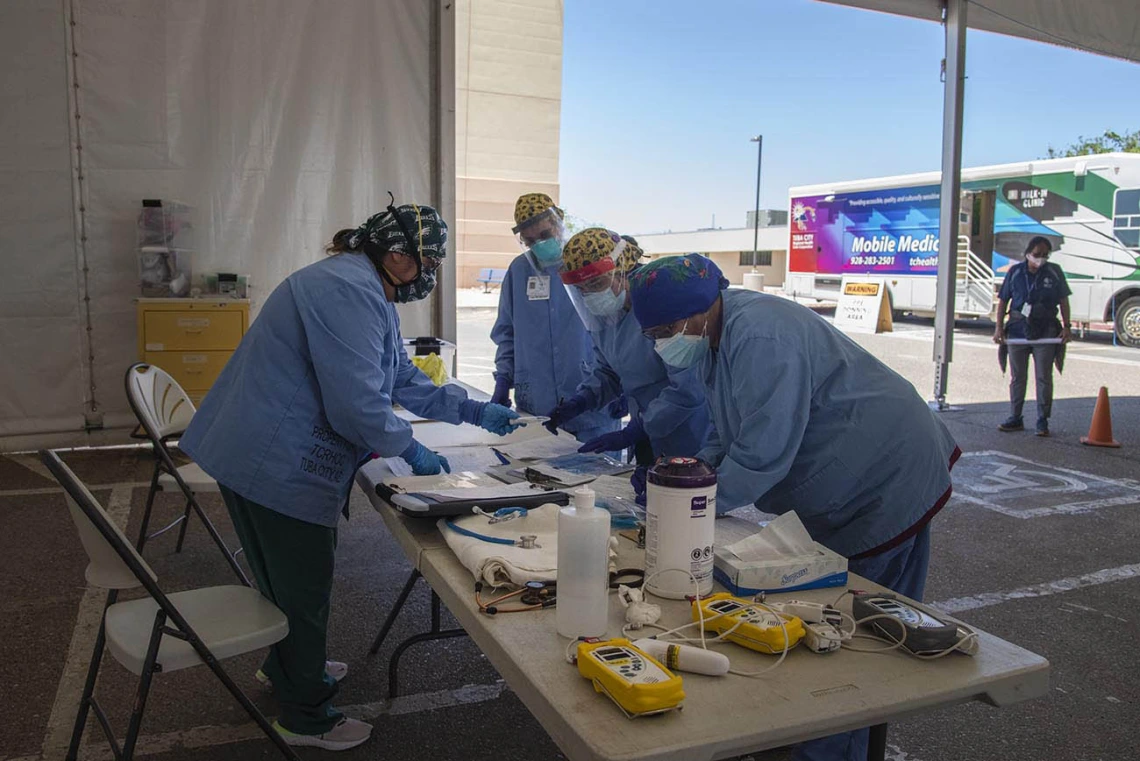Aegis Consortium funds research aimed at reducing the threat of future pandemics
The Aegis Consortium awarded seed funding to eight projects that align with the UArizona Health Sciences center’s mission to create a pandemic-free future.

The Aegis Consortium, an initiative of the University of Arizona Health Sciences, awarded approximately $650,000 in seed funding to eight pilot research projects in the areas of pandemic control, prediction or preparedness; post-acute effects of pandemics on individuals and societies; and the resilience of built and natural environments.

Janko Nikolich, MD, PhD, is the director of the Aegis Consortium and head of the Department of Immunobiology in the University of Arizona College of Medicine – Tucson.
“As we explore the challenges of pandemics such as COVID-19, we will continue to expand our investigative reach with domestic and international research teams to provide a range of solutions for preparedness, mitigation and recovery,” said Janko Nikolich, MD, PhD, director of the Aegis Consortium and head of the Department of Immunobiology at the UArizona College of Medicine – Tucson. “Together, we will become a force that challenges future pandemics.”
The one-year funding will assist with initial costs and data collection with the end goal of strengthening applications for external funding from large national organizations. Awardees may be eligible for a second year of funding depending on progress and impact.
The following projects were funded:
- “Development of Broadly Effective Coronavirus Diagnostics and Vaccines Using Evolution-proof Antibodies,” led by Deepta Bhattacharya, PhD, professor of immunobiology in the College of Medicine – Tucson, and Michael Worobey, PhD, head of the Department of Ecology and Evolutionary Biology in the UArizona College of Science. This project aims to generate antibodies, tests and vaccines to be used as interventions early in an outbreak before a new virus has been precisely identified.
- “Agent-Based and Graphical Models for Pandemics Prediction and Prevention,” led by Michael Chertkov, PhD, professor of mathematics in the College of Science, and Alon Efrat, PhD, associate professor of computer science in the College of Science. The purpose of this project is to create reliable, coherent and data-driven models to predict the spread of infectious disease at different scales.
- “Predictions of Vector-borne and Zoonotic Disease Spread: A Collaborative Response Network,” led by Leigh Combrink, PhD, assistant professor of wildlife disease and conservation in the UArizona College of Agriculture, Life and Environmental Sciences, Kacey Ernst, PhD, MPH, professor and chair of the Department of Epidemiology and Biostatistics in the UArizona Mel and Enid Zuckerman College of Public Health, and Michael Riehle, PhD, professor of entomology in the College of Agriculture, Life and Environmental Sciences. This project seeks to equip local governments with tools to accurately predict and respond to emerging infectious diseases and guard against the threat of a vector-borne pandemic.
- “BIHDS: Building Integrated Health Data Systems to Identify and Respond to the Next Pandemic,” led by Karen Lutrick, PhD, associate professor of family and community medicine in the College of Medicine—Tucson. The goal of this project is to connect different health care systems with real-world data in order to expand monitoring across all stages of medical processes.
- “Broad-spectrum Inhibitors against Viral Methyltransferases,” led by Hongmin Li, PhD, professor in the UArizona R. Ken Coit College of Pharmacy. This project aims to produce broad-spectrum, direct-acting antivirals for a re-emerging but neglected family of viruses for which there are no Food and Drug Administration-approved drugs.
- “Genomic Epidemiology of Avian Influenza Viruses in the Southwest U.S.,” led by Matthew Scotch, PhD, MPH, assistant dean and professor in the College of Health Solutions and the Biodesign Institute at Arizona State University. Co-investigators include Michael Worobey, PhD, department head and professor of the Department of Ecology and Evolutionary Biology in the College of Agriculture, Life and Environmental Sciences; Craig Woods DVM, MS, MBA, director of infectious disease and biosecurity projects in the Institute For Future Health at ASU, Arvind Varsani, PhD, professor in the Biodesign Institute and the School of Life Science at ASU, and Kevin McGraw, professor and associate director of operations and facilities in the School of Life Sciences at ASU. This study will monitor the evolution and genetic variation of highly pathogenic avian influenza in the Southwest by collecting and sequencing samples from birds and the environment. Avian influenza is one of the major infectious disease risks facing the world.
- “An Immersive Built Environment Intervention to Reduce Burnout Amongst Frontline Workers,” led by Esther Sternberg, MD, professor of medicine in the College of Medicine – Tucson and director of research at the college’s Andrew Weil Center for Integrative Medicine, J. Ray Runyon, PhD, assistant research professor of environmental science in the College of Agriculture, Life and Environmental Sciences, Mari Ricker, MD, professor of family and community medicine in the College of Medicine – Tucson, and Mirelle Phillips, CEO and founder of Studio Elsewhere. This project will address a serious pandemic workforce issue and provide solutions to prevent and reduce burnout through the built environment.
- “Development of a New Strategy for Quantifying the Environmental Transmission of Infectious Diseases in the Built Environment for Selecting Non-pharmaceutical Interventions,” led by Kelly Bright, PhD, associate research professor of environmental science in the College of Agriculture, Life and Environmental Sciences, Amanda Wilson, PhD, assistant professor in the Zuckerman College of Public Health, and Charles Gerba, PhD, professor of environmental science in the College of Agriculture, Life and Environmental Sciences. This study will quantify the risk of viruses becoming airborne based on certain activities and provide a new tool for determining which non-pharmaceutical interventions best reduce the transmission of infectious diseases.
The Aegis Consortium is building a diverse network of experts – virologists, economists, public health specialists, information architects, engineers and more – and tapping into all corners of the human experience to develop comprehensive pandemic-prevention solutions.
More than 200 UArizona faculty and over 100 external partners have led or participated in Aegis-related initiatives and research efforts since its inception in 2021.
Contact
Brian Brennan
UArizona Health Sciences
520-621-3510
brianbrennan@arizona.edu

